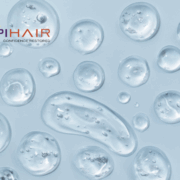Peptide Therapy for Muscle Injuries: A Breakthrough Solution
Treatment Of Muscle Injuries With Peptide Therapy
At HPIHair in Nashville, we offer personalized, physician-supported solutions rooted in science to help you address the underlying causes of hair loss. Our team of trichologists and hair loss specialists work with you to develop a clinically-based, individualized treatment plan tailored to your unique needs, whether you’re in the early stages of hair loss or seeking full restoration. With over 30 years of success in helping people regrow their hair, it’s no wonder that physicians trust us with their patients’ care. One promising option we offer is peptide therapy, a rapidly developing field that uses specific peptidesshort chains of amino acidsto potentially influence biological processes like tissue repair, immune function, and overall wellness. Though peptide therapy shows promise in supporting hair regrowth, individual results can vary, so it’s essential to consult with healthcare professionals to determine how this treatment may align with your personal health goals. Experience the power of hair science for yourselfget started on your journey today.
Muscle Injuries and Peptide Therapy
Muscle injuries can be debilitating and affect your overall well-being, which is why finding effective treatment is essential. Peptide therapy has emerged as a potential solution to support muscle recovery and repair. Here’s what you need to consider when exploring peptide therapy for muscle injuries:
Realizing Peptide Therapy: Peptide therapy involves the use of specific peptides to trigger cellular signaling pathways that can aid in tissue repair and regeneration. These peptides are carefully selected to target specific biological processes, making them a promising option for muscle injury treatment.
Potential Benefits: Peptide therapy has shown potential in promoting faster muscle recovery, reducing inflammation, and enhancing tissue repair. By targeting the underlying mechanisms of muscle injuries, this approach aims to facilitate a more efficient healing process.
Individualized Treatment Plans: When considering peptide therapy for muscle injuries, it’s crucial to work with healthcare professionals who can tailor a treatment plan to your specific needs. The individualized approach ensures that the therapy is aligned with your unique health goals and requirements.
Consultation and Assessment: Before starting peptide therapy, it’s important to undergo a comprehensive consultation and assessment with healthcare experts. This step allows for a thorough evaluation of your condition, helping to determine the most suitable peptide formulations and treatment approach.
Peptide Therapy for Muscle Injuries: What to Expect
As you explore the potential of peptide therapy for muscle injuries, it’s important to have a clear realizing of what this treatment entails. Here’s what you can expect when considering peptide therapy as part of your muscle injury recovery plan:
Targeted Approach: Peptide therapy offers a targeted and precise mechanism for addressing muscle injuries. By harnessing the power of specific peptides, this approach aims to directly influence cellular processes related to tissue repair and regeneration.
Customized Formulations: Healthcare professionals specializing in peptide therapy will work with you to develop customized peptide formulations that are tailored to your unique muscle injury needs. These formulations are designed to optimize the therapeutic effects of the peptides for enhanced recovery.
Potential Side Effects: Like any treatment approach, peptide therapy may come with potential side effects. While adverse reactions are rare, it’s important to discuss any concerns or preexisting conditions with your healthcare provider to ensure the safe and effective use of peptide therapy.
Monitoring and Adjustments: Throughout the course of peptide therapy for muscle injuries, healthcare professionals will closely monitor your progress and make any necessary adjustments to the treatment plan. This comprehensive approach ensures that the therapy remains aligned with your recovery goals.
The Role of Peptide Therapy in Muscle Injury Recovery
Peptide therapy offers a unique pathway for supporting muscle injury recovery, complementing traditional treatment approaches. Here’s how peptide therapy plays a significant role in the overall healing process:
Accelerated Recovery: By targeting specific cellular pathways involved in muscle repair, peptide therapy aims to accelerate the natural healing process, potentially leading to faster recovery from muscle injuries.
Reduced Inflammation: Inflammation is a common factor in muscle injuries, contributing to pain and prolonged recovery. Peptide therapy has demonstrated potential in modulating the inflammatory response, which can contribute to reduced discomfort and improved recovery.
Tissue Regeneration: Peptides used in therapy are selected for their ability to promote tissue regeneration, facilitating the repair of damaged muscle fibers and supporting the overall restoration of muscle function.
Complementary Approach: Peptide therapy can be integrated as part of a comprehensive approach to muscle injury recovery, working in synergy with other treatments such as physical therapy and rehabilitation to optimize the healing process.
Consult with Our Peptide Therapy Experts Today
With our dedicated team of healthcare professionals, you can explore the potential of peptide therapy for muscle injury treatment with confidence and clarity. Schedule a consultation with our experts at HPIHair in Nashville to discover how peptide therapy can be personalized to support your muscle injury recovery journey. Reach out to us today and take the first step toward a comprehensive approach to muscle injury healing.













